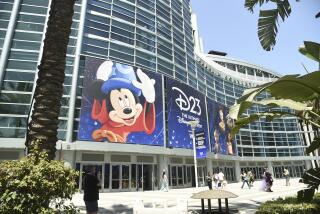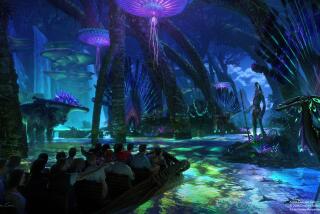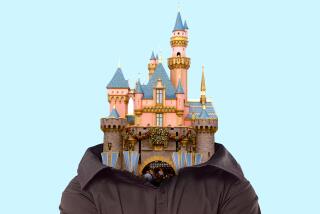Is there enough Chinese demand for a double dose of Mickey Mouse?
Reporting from Hong Kong — Will the opening of Shanghai Disney suck the wind out of the sails of Hong Kong Disneyland or push more mainland Chinese to visit the new resort?
That’s the multimillion-dollar question facing Hong Kong government officials and Disney executives as the theme park giant prepares to open its Shanghai resort on June 16.
Attendance at Hong Kong Disneyland dropped sharply in the 12 months ending September 2015, the park has said, falling to 6.8 million from a record high of 7.5 million in 2014. Hotel occupancy declined to 80% from 93%. The facility — which is 52% owned by Hong Kong’s government and 48% by Disney — reported a loss of about $20 million.
The resort was battered by a slowing economy and a decline in tourism from mainland China in the wake of 2014’s pro-democracy protests in the semi-autonomous Chinese territory.
Executives say they’re optimistic that visitors will be attracted by a new “Iron Man” attraction, now undergoing testing, along with a 750-room Explorers Lodge Hotel that will debut in 2017. In addition, Disney representatives expect that some mainlanders who have their first taste of Disney in Shanghai will be enticed to experience other parks, including Hong Kong’s.
Disney representatives say that the market is large enough to support multiple parks.
“From the beginning, our strategy was to create two complementary parks that have their own distinct experiences,” Disney spokeswoman Angela Bliss said. “The U.S. supports two Disney resort destinations, with six theme parks, and the population is relatively smaller than China’s.”
Bliss noted that many vacationers who first sampled Disneyland Paris later opted to take a longer trip to Disney’s parks in Orlando, which offer an even wider variety of attractions as well as more tropical weather.
However, Hong Kong Disneyland is highly dependent on mainland visitors. Last year, mainlanders made up 41% of visitors, while Hong Kongers accounted for 39%. The remaining 20% came from other countries. In 2014, mainland visitors accounted for 48% of guests.
For many Disney aficionados from southern China, Hong Kong will continue to be more convenient than Shanghai, which is 800 miles away on the eastern coast.
“The market for theme parks tends to be regional in nature,” said John Ap of the Institute for Tourism Studies in Macau. Hong Kong will continue to draw from the 50 million people in the Pearl River Delta, whereas Shanghai will attract tourists from the 300 million-strong Yangtze River region, he said.
But Hong Kong will need to come up with fresh offerings to maintain its appeal, he said. “Any theme park needs to constantly innovate and change,” he said.
Hong Kong resident Dicky Yu and his wife bought annual passes after their son, Carson, was born five years ago. They come two to four times a year, and Carson particularly enjoys attractions like the Disneyland Railroad, a faux steam locomotive, and the Autopia race cars.
But Yu knows the park won’t hold his son’s attention when he’s older, and Yu himself is bored with it.
“It’s just too small. I want to see something that surprises me,” he said. “Once he grows out of the thrill of the rides, we’ll stop coming. If the park stays like this, I feel the number of visitors will decline.”
When plans for a Shanghai park were announced, about two years after the 2005 opening in Hong Kong, media reports described a sense of shock — and betrayal — among the public. But “we always knew there would be a park in Shanghai,” said Mike Rowse, a retired government official who led the negotiation with Disney. Rowse recalled local officials had prodded Disney to consider Beijing, 400 miles farther away than Shanghai.
Theme park consultant Edward Marks, who worked on Shanghai Disney, said the Hong Kong park was much too small when it opened. What’s more, the attractions weren’t comparable in quality to those in the California or Florida parks, said Marks, executive producer and co-chief executive of the Producers Group.
Since then, the Hong Kong park has added three themed lands and grown by about 25% to 68 acres. In addition, the Hong Kong government has said it is in discussions with Disney about the expansion of Hong Kong Disneyland.
There is still room around the park for growth, if both Disney and the Hong Kong government can agree on a new investment.
Liu Wenwen was visiting the park in early May with his two children. His daughter, he said, had been begging to come since her kindergarten classmates had visited.
So over the May Day holiday weekend, he and his kids took a three-hour bus ride from the mainland city of Guangzhou to Hong Kong for a rare getaway. He says he’s unlikely to go to the new Shanghai Disneyland.
“Shanghai is kind of far,” Liu said. “The water park in my city is much better.”
Law, a special correspondent, reported from Hong Kong and Makinen, a Times staff writer, reported from Beijing. Times staff writer Hugo Martin in Los Angeles contributed to this report.
More to Read
Inside the business of entertainment
The Wide Shot brings you news, analysis and insights on everything from streaming wars to production — and what it all means for the future.
You may occasionally receive promotional content from the Los Angeles Times.











